14. Fallen Angels (1995, Wong Kar-Wai)
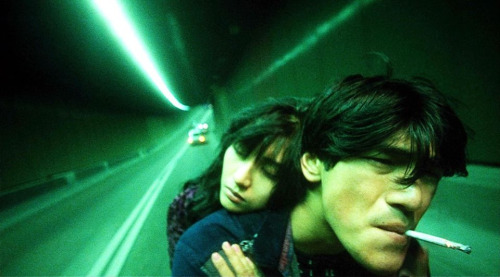
Fallen Angels, like As Tears Go by and Chungking Express, is a tale of love and obsession, as well as an erratic yet coherent fresco of Kowloon nightlife, all woven with what seem to be plot-line inserts from very typical gangster films. And all works harmoniously.
Fallen Angels is comprised of two inter-connected stories. First one is a tale of infatuation. The two protagonists are a social recluse and professional hitman Wong Chi-Min and his agent, a 20 year old Kowloon party girl. WHile the two almost never meet, it all becomes a fetishistic game of obsession for her till she finds out that he has somebody he loves and is considering of giving up the life. This prompts her to put a hit on her crush.
Second vignette is a tale of unfulfilled love. Ho Chi Moo is a mute burglar that breaks into people’s houses for kicks rather than money. He falls in love with Charlie , who coming of a nasty break-up with her ex-boyfriend. Their flame fades and they eventually break up. He ends up being hired by Min’s obsessive fan and agent to kill him, before knowing that his target is now seeing his beloved Charlie.
Fallen Angels is not meant to be a social realist depiction of criminal life but it is no less of a crime film. If you wish, it acts as an emotional cartography through the lives of the undesirable, of the bottom feeders and of the underworld. In that respect, Wong Kar Wai comes across very much as a Sam Fuller of Hong Kong cinema. They both build narrative theme parks through lives and hurts of lost souls. Fallen Angels does feel like Wong-Kar Wai’s own Pick Up on South Street.
Fast paced editing, occasionally nauseating usage of tilted angles and a minimal chromatic palette cinematography makes Fallen Angels quite unique. Wong Kar Wai would later on go for more lavish, spectacular and dreamy auteur flicks, but his tale of obsessive love remains one of his most striking works to date.
13. Beast Cops (1998, Gordon Chan)
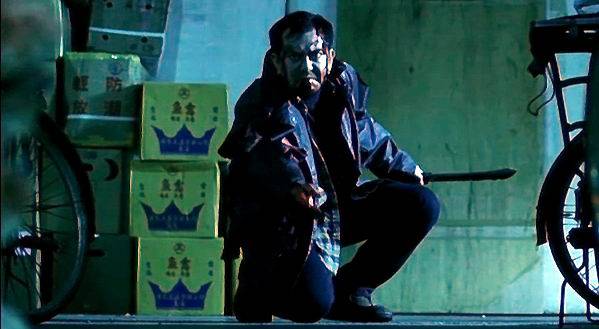
“In this world in between black and white, there is a grey area. Some people have a small one, some people have a great one.” As much as it sounds like something David Brent would say in the comedy series The Office, it comes from one of Hong Kong’s most oddball creations Beast Cops and perfectly sums up the film.
Beast Cops is a buddy movie which becomes a compendium of grey areas, whether it’s morality or legality or simply sexual hygiene.
In a tour de force performance, veteran actor Anthony Wong plays police officer Tung, the crown prince of grey areas. He spends most of his time in gambling dens, lounging with prostitutes and drinking with gangsters. Tung’s life is turned upside down when his new boss , Michael Cheung (Michael Wong) arrives, a by the books Lieutenant who while tries to instill law and order back into the precinct. With the disappearance of gangster boss Tung, Fai, the power vacuum is filled by up and coming ruffian Push-Pin and his cronies. Tung and Michael are caught up in the middle of his violent rise to power.
Beast Cops is brilliant at using contrasts between characters and juggling narrative and film techniques would otherwise be part of different genres. Wong’s aloof and immoral officer is in perfect contrast with the boy scout righteousness of Cheung’s character.
Beast Cops alternates high octane action sequences with scenes where the fourth wall is broken as well long dialogue scenes about love and relationships. The final scene makes it feel like Hong Kong had turned the tide and a torn a page from Tarantino’s playbook, with its cynical dialogue, excess violence and surf rock soundtrack.
12. Infernal Affairs 2 (2003, Andrew Lau and Alan Mak)
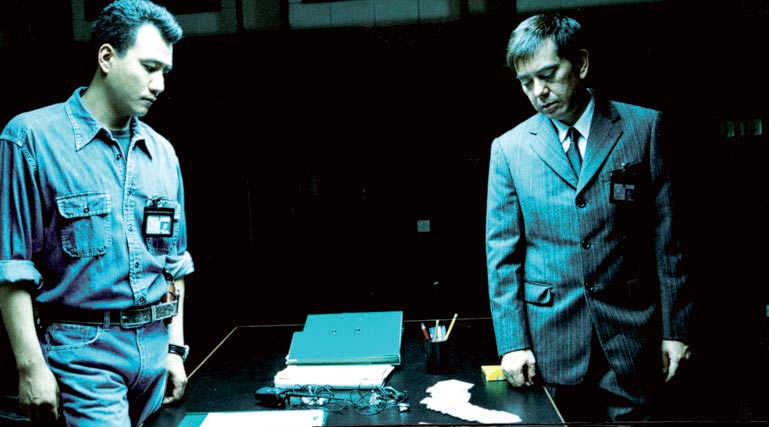
After the huge success of the first film, there was an immense pressure on the creative team of Alan Mak and Andrew Lau to turn Infernal Affairs into a film franchise. Hong Kong, like Hollywood, is no stranger to overstretching plotlines on the fringe of believability in order to cash in on the success of a first film that really needs no sequel. The two sequels to A Better Tomorrow are a testament to that.
But Mak and Lau did find an ingenious way to do it. Instead of plunging the surviving characters of the first film into further intrigues, they chose to rewind the story to the very beginning and go deeper into the moral fabric and motivation of the characters.
Infernal Affairs 2 is a much more introspective prequel where the two string masters from the previous film, Inspector Wong and triad leader Sam, here seen as friends, with Sam being Wong’s informant. Young hoodlum Ming rises through the ranks being offered by Sam’s wife to kill reigning boss and young Yan slowly infiltrates the Hong Kong triad world. A struggle for power and several gangland killings will change the character’s lives forever.
If anything, the prequel really tightens some loose ends regarding the backstory and the motivations of the two characters, that was otherwise quite rushed in the first film. Yan is an ambitious young man with gangland ties that just wants to become a “good guy” by joining the police while Ming is go getter that slowly abandons scrupules to get to the top.
While the first film showed both sympathetically and as being quite similar, the second film really sets them apart. It has less of the action spectacle and the psychological tension of the fist, but it still a very entertaining.
11. Running Out of Time (1999, Johnnie To)
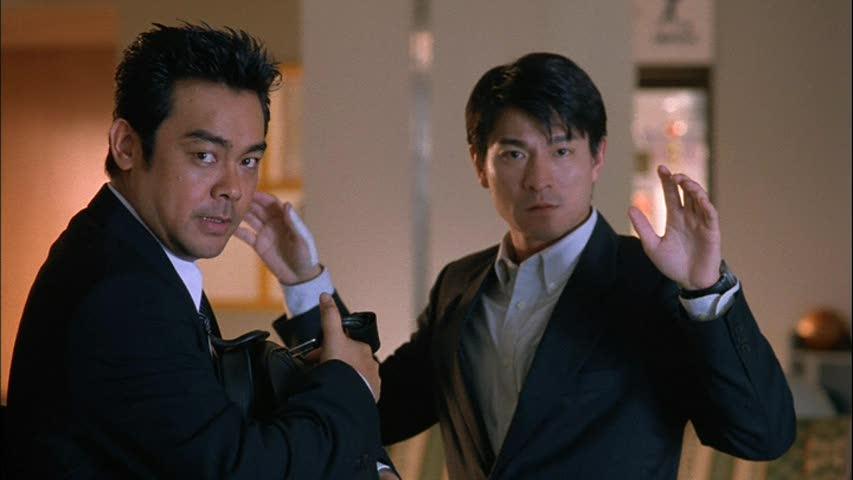
1999 was Johnnie To’s year of grace as he released two films that became instant classics of Hong Kong cinema. One was the impeccable ensemble piece The Mission. The other is Running Out of Time which is one of the few films produced by his own Milky Way production company that aimed to be a commercial success, which it certainly was.
The wheels are set in motion when heist mastermind Cheung, played by Andy Lau, finds out that he’s terminally ill and has only four weeks to live. While Cheung continues to carry out jobs when he becomes intrigued with police officer Ho, played by Lau Ching-wan, a good cop that feels underappreciated and stuck in a dead-end career spot. Cheung lures him into a 72 hour cat and mouse game putting his own freedom at stake.
Running Out of Time is more dynamic and fast paced than director Johnnie To’s usual crime films with more use of dynamic camera pans, chase sequences and more fast-cut editing . The film lays out several complicated plot threads and twists but the storyline does not become convoluted.
The great quality of the film is that it takes the whole cat and mouse chase between formidable foes arc and makes it wholly believable. The scene where Cheung stages a break-in and a hostage situation just to meet Ho is incredibly entertaining and wholly believable.
The interplay between the two antagonists is indeed the main trigger of the film and Johnnie To really build the contrast well between introverted mastermind Cheung and more verbose and cynical Ho. Andy Lau gives a surprise performance, acting in a more subtle and reserved manner as director Johnnie To wanted Lau to depart from his usual bombastic acting style.
10. God of Gamblers (1989, Wong Jing)
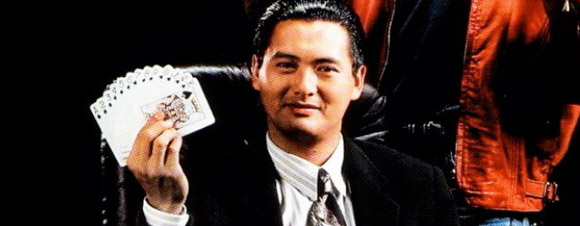
While the gambling film genre had been popular in Hong Kong ever since the 1970s, it wasn’t until Wong Jing’s epic that this particularly Cantonese sub-genre became internationally known.
Chow Yun Fat stars as superstar gambler Ko Chun, who travels the world playing various high stakes games of chance. His skill and intuition make him unbeatable at anything from card games to dice and mahjong. For this reason, Yakuza boss Tanaka hires him to go to Singapore and ruin his long time foe, Chan Kam-Sing.
However, Ko Chun has an unfortunate accident and loses his memory. He is taken in by hapless gambler Knife, played by Andy Lau Knife soon discovers Ko Chun’s amazing talent for gambling in soon turns him into his own cash cow. Unknown to both Cham Kam-Sing finds of Tanaka’s plot and does anything in his power to track and kill Ko Chun.
It is very difficult to pin down what genre God of gamblers belongs .It shifts with sometimes breakneck speed from situational comedy to high octane action shootouts and scenes emulating the elegance and pezas of Bond films, but Wong Jing managers to make all of this seem natural. It also does a great job at shifting from an almost fantasy realm of luxury and success at the beginning to the very real gutter reality of Hong Kong everyday life.
By 1989, Chow Yun Fat was already a superstar in Asia. But God of Gambler re-affirmed his great acting range. He plays with equally effortless charm the suave and classy gambling champion as he plays the childish and naive amnesiac.
9. Made in Hong Kong (1997, Fruit Chan)
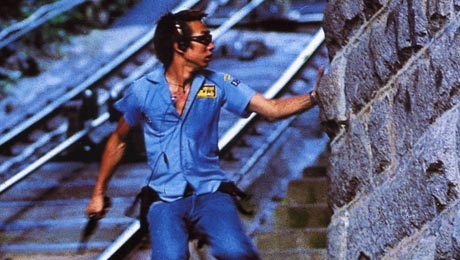
Fruit Chan’s indie epic about life in Hong Kong’s housing estates is probably one of the most Asian critically acclaimed films of the 90s. Made on a shoestring budget with mostly unprofessional actors, it deals with social issues with compelling realism, dark humour and a subtle sentimentality.
Autumn Moon is petty debt collector lives with his mother in a poor housing estate and roams around with his mentally disabled friend Sylvester. He slowly falls in love with Ping, whose estranged father owes several loan shark’s money, including Moon’s boss.
As Ping reveals that she will die of cancer unless she undergoes a liver transplant, Moon begins questioning his lifestyle and tries to find different angles for securing the money for Ping’s transplant. In the midst of this, Sylvester finds the suicide notes of a girl that had just thrown herself of a building. This prompts Sylvester, Moon and Fruit to go around town to give the notes to the girl’s boyfriend and parents, to whom the notes were addressed.
Many have called Made in Hong Kong the island country’s first true indie, as the entire finance was raised by Chan from money saved working as an assistant director, allowing for more creative freedom.
The film engages in several plotlines but the narration never becomes hard to follow as the characters are constantly the focus of the film. Sam Lee gives an incredibly natural and nuanced performance as street smart hustler Moon.
Coming out in 1998, Made in Hong Kong was a breath of fresh, clashing with the young triad craze started with Young and Dangerous. It de-mistified life in the criminal underworld by focusing on the miserable dead-end existence of the lowest ranks and how the criminal brotherhood system actually cripples prospects for young Cantonese youth.
8. The Mission (1999, Johnnie To)
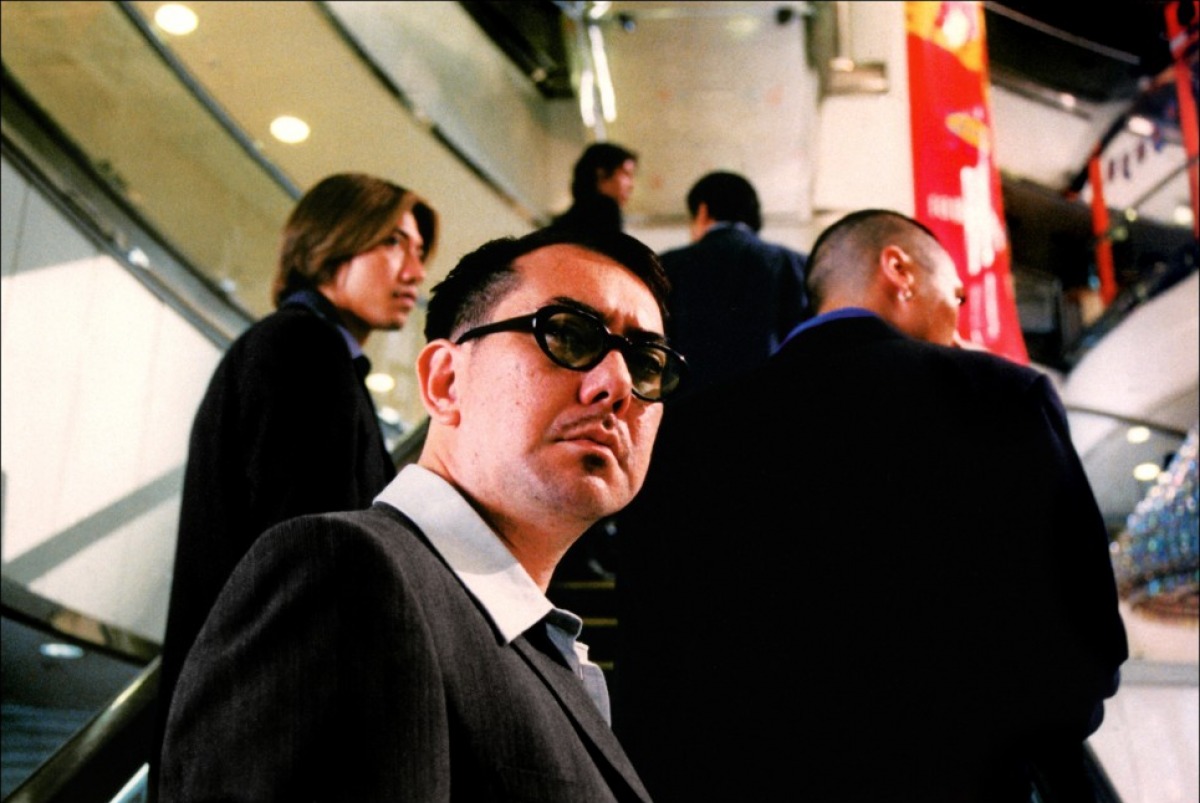
The Mission refined the Hong Kong crime thriller. While the story is typical for the Triad genre, the way maverick director Johnnie To chose to tell it, turned into a cinematic gem . It would be a blueprint for future films that his company Milky Way would produce.
The Mission revolves around 5 Triad members that are given the task of guarding top underworld boss turned businessman Lung after a failed assassination attempt made on his life. The skeleton crew which results is a canope of contrasting personalities and temperaments, portrayed by some of Hong Kong’s finest actors and Johnnie To regulars.
The group consists of short-tempered bar owner Roy ( Francis Ng) , his young and slightly reckless protege Shin (Jackie Lui), antisocial gun expert James (Lam Suet), playboy Mike (Roy Cheung) and soft spoken legendary killer Curtis (Anthony Wong). The film follows how this gang of mercenaries become the best of friends, while the it is slowly revealed who is behind the assassination attempts.
This impromptu gang of bodyguards is really the main focus of the film-the scenes which actually focus on on boss are few and far in between. The Mission is one elegant collection of character studies, that To uses to explore themes of loyalty and friendship.
The film uses very static and mostly medium shots, camera pans are used precisely and it contains economic use of dialogue. The action scenes are rather reminiscent of classic face offs in French crime films, such as Jean-Pierre Mevlille’s Le Circle Rouge.
Overall, more camera time given to the mundane moments of expectation and boredom that to the action scenes. To is more interested in showing awkward and idiosyncratic aspects of criminal life than doing a fast-paced guns-a-blazing epic The silence and subtitly that pervades throughout the film creates an incredible sense of tension and unease, alternating with scenes of deadpan humour.